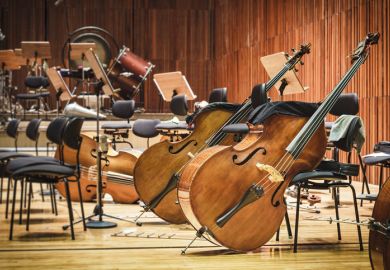Beethoven without deafness, Schubert without syphilis, Shostakovich without Soviet harassment - would their music have been so cogent? And Sir Malcolm Arnold without his instability? The mood swings of the man and his music become understandable when you know his life story: registered as a schizophrenic at 21, plagued by mental troubles and aggravated by alcoholism ever since.
Biographers Anthony Meredith and Paul Harris question whether the problem is schizophrenia or manic-depression. Manic-depressives apparently need less sleep when on a high, which could explain how Arnold composed 50 minutes of music for the film score for The Bridge on the River Kwai in an almost superhuman ten days.
Arnold's father was a wealthy Northampton boot manufacturer. The family was not inclined to displays of affection, but there were plenty of signs of mental illness, from mad aunts to suicides. At an early age Arnold played violin, piano and trumpet, and meeting and hearing Louis Armstrong clinched his concentration on the trumpet. General education was less appealing:after a few hours at a public school, he called for the family chauffeur to take him home for good.
He studied at the Royal College of Music in London and made a name for himself for wenching and boozing. Arnold had already mastered the setting down of notes on paper as a child, with his mother regularly receiving compositions as seasonal presents.
At 20 he married a pretty Yorkshire violinist, Sheila Nicholson, who tried hard to curb his drinking, and there were periods when he was full of fun and a good father. He joined the London Philharmonic Orchestra and became its first trumpet. Although a Communist Party member and a registered conscientious objector, he signed up for the Army when Russia joined the war. But he was so disgusted at being put in a band that he shot himself in the foot, was discharged and returned to the LPO.
Arnold's brilliant, noble sound and innate musicianship could on occasion lift the orchestra out of a rut. And ruts there were in war years when the LPO was slogging round the country playing the same few classics. But Arnold enjoyed the camaraderie of a nearly all-male group. There were girls, though, waiting after concerts to be taken to the nearest pub or nearest bed. For some performances and recordings, there were distinguished conductors: Sir Thomas Beecham, Hans Knappertsbusch, Victor de Sabata and Eduard van Beinum. The last took an interest in Arnold's Beckus the Dandipratt overture, both performing and recording it.
Suddenly, Arnold became known as a composer. Here was a new and unique voice: airy, brilliant scoring with no middle-of-the-spectrum doubling mush for a focusing on the top and bottom registers, embracing good tunes and tonal shocks, a quiet passage succeeded by a ferocious fortissimo (the musical equivalent of schizophrenia, as the authors point out).
Soon Arnold got into films; first documentaries, then features. He would score more than a hundred in 21 years, including Hobson's Choice, The Inn of the Sixth Happiness, David Copperfield, Trapeze and any number of St Trinian's films.
Quicker than other composers, he proved himself efficient, professional and much liked as a conductor. Films enabled him to hang up his trumpet but did not prevent him from producing a stream of works: solo, chamber music, ballets and other orchestral music, often concertos written for friends such as Richard Adeney, Julian Bream, Micaela Petri, Dennis Brain and Benny Goodman. Everything he wrote was clean, practical and hummable. He wanted his music to be accessible and to entertain.
The only thing he was not so good at was PR. His interviews were perfunctory and his programme notes laconic. And, usually because he was tight, he put his foot in it socially, notably in Downing Street and the court of Benjamin Britten at Aldeburgh. The establishment closed ranks - it was a period when atonal music was rife. Arnold's recordings sold well, but on the whole he was mauled by the critics.
He was usually sober when conducting but when work was over he binged, eventually going to pieces. I worked in the LPO office and knew him well.
Mostly he was the life and soul of the party, but he could suddenly turn nasty, sometimes baring his teeth like an animal. He attacked Sheila twice and had to be put away. He has spent something like four years sectioned or under restraint. Sheila divorced him; his second wife, Isobel, did the same. Doctors said that alcohol and illness had irreparably injured his brain and he could not live long. But Arnold is still going, looked after in Norfolk by a devoted carer.
Biographies these days tend to be too long; having done the research the authors include it all, more than you ever wanted to know. But there is not a page too many in this biography. Meredith and Harris have done an astonishing amount of research, and the result is a fascinating read, both for music lovers and those interested in the case of a creative mind whose life has been chequered.
Malcolm Arnold is exactly what the title proclaims: a rogue genius, and still underrated.
John Amis is music critic of The Tablet .
Malcolm Arnold: Rogue Genius: The Life and Music of Britain's Most Misunderstood Composer
Author - Anthony Meredith and Paul Harris
Publisher - Thames/Elkin www.elkinmusic.co.uk
Pages - 529
Price - £29.99
ISBN - 0 903413 54 X
Register to continue
Why register?
- Registration is free and only takes a moment
- Once registered, you can read 3 articles a month
- Sign up for our newsletter
Subscribe
Or subscribe for unlimited access to:
- Unlimited access to news, views, insights & reviews
- Digital editions
- Digital access to THE’s university and college rankings analysis
Already registered or a current subscriber?



